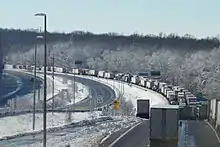2021–22 North American winter
The 2021–22 North American winter was not as significant and record-breaking as the previous winter season. Despite this, several notable and significant events still occurred, including two separate record-breaking tornado outbreaks in mid-December, a significant winter storm in the South in mid-January, a powerful blizzard that impacted the Northeast coast at the end of January and a wide-ranging, significant winter storm that affected most of the eastern half of the country in early February. Additional significant events included a late-season winter storm in March that affected the Appalachian Mountains, and a major blizzard that affected North and South Dakota in mid-April. Addiitonally, a very late out-of-season snowstorm struck the Rocky Mountains in late May. During the season, four storms have been ranked on the Regional Snowfall Index (RSI), although none attained the “Major” category. Similar to the previous winter, a developing La Niña was expected to influence weather patterns across the continent.
| 2021–22 North American winter | |
|---|---|
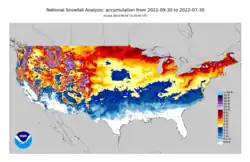 Seasonal snowfall in the contiguous United States | |
| Seasonal boundaries | |
| Meteorological winter | December 1 – February 28 |
| Astronomical winter | December 21 – March 20 |
| First event started | October 12, 2021 |
| Last event concluded | May 21, 2022 |
| Most notable event | |
| Name | January 2022 North American blizzard |
| • Duration | January 27–30, 2022 |
| • Lowest pressure | 969 mb (28.61 inHg) |
| • Fatalities | 4 fatalities |
| • Damage | $50 million (2022 USD) |
| Seasonal statistics | |
| Total storms (RSI) (Cat. 1+) | 5 total |
| Major storms (RSI) (Cat. 3+) | 0 total |
| Maximum snowfall accumulation | 60 inches (150 cm) east of Pinecrest, California (December 13–18, 2021) |
| Maximum ice accretion | 0.8 inches (20 mm) in Lake Ariel, Pennsylvania (February 1–5, 2022) |
| Total fatalities | 42 total |
| Total damage | ≥ $1.97 billion (2022 USD) |
| Related articles | |
Based on the astronomical definition, winter began on the winter solstice on December 21, 2021 and ended on the spring equinox on March 20, 2022.[1] Based on the meteorological definition, the first day of winter started on December 1 and the last day was February 28.[2] These dates historically describe the period in each year when winter storms are most likely to occur. However, winter storms may occur outside of these limits, as shown by the early formation of this season's mid-October winter storm on October 12. Since both definitions of winter span the start of the calendar year, it is possible to have a winter storm spanning two different years. In addition, major winter events can occur well after the official start of spring, as close as June in some cases, as shown by a very late-season winter storm that impacted Colorado in late May 2022 with heavy snow following warm temperatures just a day beforehand.
Seasonal forecasts
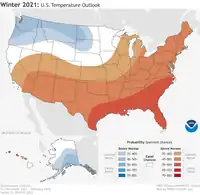
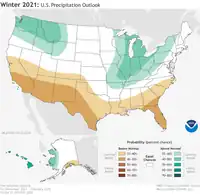
On October 13, 2021, The Weather Channel (TWC) released its U.S. winter temperature outlooks for the 2021–22 winter season.[3] The forecasts reflected the likelihood of a weak La Niña pattern and weak polar vortex during much of the season. Overall for the winter, significantly above-average temperatures were forecast for most of the Southern Tier, with near-average temperatures in the Central and much of the Northeastern United States. Slightly below-average temperatures were expected in most of the north-central and northwestern U.S. During the first half of the season, a relatively weak La Niña was expected to result in widespread below-average temperatures across the northern half of the country, with widespread above-average temperatures in the southern half. However, as both the La Niña and polar vortex were expected to strengthen later in the season, widespread above-average temperatures were forecast in most of the U.S. during the latter half of the winter, especially in the South and East. Below-average temperatures were still expected to continue in the far Northwestern U.S.[3]
On October 21, 2021, the National Oceanic and Atmospheric Administration's Climate Prediction Center released its U.S. Winter Outlook for the upcoming winter.[4] The temperature and precipitation outlooks reflected a typical La Niña weather pattern during the winter. Significantly above-average temperatures were forecasted across the Southern Tier, especially in the Southeast, with slightly above-average temperatures forecast in the Ohio Valley and Northeast. Near to below-average temperatures were expected in the far northwestern U.S. Below-average precipitation was expected across the far Southern Tier, with particularly in the Southwest, with above-average precipitation forecast in the far Northwestwern U.S., as well as the Ohio Valley and surrounding regions. Near-average precipitation was expected in the Central U.S., Northern Plains, and Northeast. Drought was forecasted to improve and end in the Pacific Northwest, while it was expected to develop or worsen across the Southwest. Drought was not expected in the eastern half of the country.[4]
Seasonal summary

The 2021–22 winter season began with the formation of a significant winter storm in the Western United States on October 12, resulting in heavy snow accumulations of up to 28 in (71 cm) across much of the Intermountain West and over 80 rescues due to blizzard-like conditions in Utah.[5][6] The system was estimated to have caused at least $50 million in damages.[7] After a one-month break in winter weather events due to unfavorable conditions for winter storms, a blizzard began to develop across south-central Canada and the Upper Midwest on November 11.[8] December 2021 saw a record warm month across the Lower 48. Ten states (New Mexico, Texas, Louisiana, Mississippi, Alabama, Oklahoma, Arkansas, Missouri, Kansas, and Nebraska) saw record warm December's.[9] An early December heat wave set all-time record highs in Montana, Washington, Wyoming, and North Dakota. Parts of British Columbia saw temperatures of 22.5 °C (72.5 °F), tying it for an all time Canadian high in December.[10] In early-to-mid December, a major system produced a historic tornado outbreak along with wintry weather in the Upper Midwest, followed by another powerful storm that produced an ever larger tornado outbreak along with strong winds across the High Plains just a few days later. The storm, being a category 3 atmospheric river event,[11] brought heavy rain and snowfall to the Western United States. Over 8 inches (20 cm) of rain during the storm were recorded on Mount Tamalpais, a mountain in the San Francisco Bay Area, with San Francisco itself receiving around two inches of rain from the event.[12] Around 60 inches (150 cm) of snow was recorded in Pinecrest, California.[12] The storm caused statewide snowpack in California to increase from 19% of normal to 83% of normal.[13]
Later that month and into early January, a series of winter storms brought a cold snap and heavy snowfall to parts of the West Coast, particularly areas in the Pacific Northwest region.[14] Several weather stations in Washington state recorded record-breaking low temperatures for December 26 and 27, with temperatures at 17 °F (−8 °C) in Seattle and 7 °F (−14 °C) in Bellingham.[15] This became Seattle’s coldest day in 31 years, because the high for the day was only 23 °F (−5 °C).[16] Seattle recorded 9.2 inches (23 cm) of snow in December, exceeding the city's normal winter average,[17] while some parts of the region had more than 1 foot (0.30 m).[18] With five days of snow in a row, Seattle saw the most consecutive snowy days on record since 1969.[19] Another storm on January 6 led to the closure of several mountain passes in the Cascade Range, leaving only one east–west route across Washington. Snoqualmie Pass reopened to limited traffic four days later.[20][21] In Vancouver, British Colombia, the temperature dropped to −15.3 °C (4.5 °F) on December 27, the coldest temperature there since 1969.[22]
Before additional snow events occurred throughout January, with below-average temperatures being common, Falcon Lake, Texas, set a record for the highest January temperature in the contiguous United States on January 1, at 99.0 °F (37.2 °C).[23] One such storm in January was the a significant winter storm in the eastern half of the country in mid-January with snow and ice,[24] causing Georgia, Virginia, North Carolina and South Carolina to all declare a state of emergency in preparation for the winter storm.[25] The most significant event occurred at the end of the month, when a major blizzard struck the Northeastern United States on January 28–29. This storm brought up to 1–3 inches (2.5–7.6 cm) across a swath of New England and caused widespread impacts. Blizzard conditions were confirmed at multiple locations in New England, including Providence, Boston, and Worcester,[26] in addition to some areas on the Jersey Shore receiving blizzard conditions. In early February, another major winter storm affected the country, with areas as far south as Texas to as far north as Maine receiving significant snowfall, though in the former it was not as bad as the previous year's storm which crippled the state's power grid.[27] Howard Pass, Alaska saw a wind chill of −91 °F (−68 °C) on February 7.[28]

The rest of February saw less significant wintry events aside from a few concentrated snowstorms in some areas, particularly the Northeast, but activity increased again in mid-March after a significant winter storm affected a wide swath of areas from Louisiana to Maine, dropping widespread snow amounts of 6–18 inches (15–46 cm).[29] After a few late-season cold snaps, a a major blizzard struck the Dakotas in mid-April, dropping as much as 40 inches (100 cm) of snow, unusual for so late in the season.[30] The last significant event occurred in late May after a record-late snowstorm struck Colorado just days after temperatures had been near 90 °F (32 °C).[31] However, on June 19, 2022, a hiker died due to hypothermia in Maine, and temperatures below freezing were recorded that morning in Canaan Valley in West Virginia, Mount Washington in New Hampshire, and Waverly, New York.[32] Caribou, Maine, saw their latest day where the high failed to reach 50 °F (10 °C), with highs of 49 °F (9 °C).[33]
Events
Mid-October winter storm
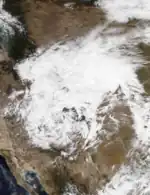  | |
| Duration | October 12–14, 2021 |
|---|---|
| Lowest pressure | 988 mb (29.18 inHg) |
| Maximum snow | 28 in (71 cm) |
| Fatalities | 0 fatalities |
| Damage | Per Aon: ≥ $50 million (2021 USD)[7] |
On October 10 at 03:00 UTC, an extratropical cyclone made landfall near Vancouver.[34] This cyclone's remnants became a weak, elongated frontal system over the interior West Coast by October 11 at 12:00 UTC.[35] After remaining disorganized for about 12 hours, the system began to coalesce into a stronger extratropical cyclone over Colorado on October 12.[36] It also began to drop snow over parts of the Rocky Mountains by this point. The system then merged into a well-formed extratropical cyclone with a single-low pressure center by early the next day, beginning to steadily intensify.[37] Snowfall rates began to rapidly increase in bands to the west of the center throughout the day, with up to a foot of snow falling within hours. The system reached its peak intensity of 988 mbar (29.2 inHg) at 21:00 UTC on October 13.[38][39] The extratropical cyclone then began to accelerate to the north, becoming occluded in the process.[40][5] The weakening system then moved into the Canadian Prairies, resulting in some more snow there,[41] before merging into another frontal system on October 15.[42]
The precursor to the system resulted in blizzard conditions across parts of northeastern Utah on October 11, disrupting a 50-mile ultramarathon occurring there. Extremely heavy snowfall rates and winds gusting to tropical storm-force resulted in the race being called off, and over 87 rescues had to be made in the snow.[6] The next day, up to 6 inches (15 cm) of snow fell across mountainous areas of Colorado as the system was organizing.[43] The system also resulted in wind gusts of over 64 mph (103 km/h) in parts of Nevada that day.[44] On October 13, the system moved north into areas such as Wyoming, with 17.4 inches (44 cm) of snow falling in Casper, and even higher totals in the high elevations.[45] Additionally, hurricane-force wind gusts were recorded across parts of eastern Colorado and western South Dakota, with a 74 mph (119 km/h) gust occurring in Wasta. As the storm system reached peak intensity on October 14, heavy snowfall rates resulted in snowfall totals of over 2 feet (0.61 m) in parts of eastern Montana, with the storm's maximum snowfall total of 28 inches (71 cm) occurring in Pony. Larger cities such as Billings and Bozeman also saw 8–12 inches (20–30 cm) of snow from the system. Areas in the Black Hills such as Deadwood and Whitewood measured over 24 inches (61 cm) of snow, with Rapid City also recording 3 inches (7.6 cm).[5] As the system moved into south-central Canada later that day, it also resulted in some light snowfall there before the system dissipated the next day.[46] According to Aon Benfield, the system was estimated to have caused at least $50 million (2021 USD) in damages.[7]
Late October West Coast bomb cyclone
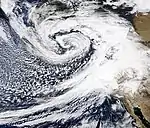  | |
| Duration | October 23–26, 2021 |
|---|---|
| Lowest pressure | 942 mb (27.82 inHg) |
| Maximum snow | 42 in (110 cm) |
| Fatalities | 2 fatalities |
| Damage | Per Aon: $400 million[47] |
In late October 2021, a powerful bomb cyclone struck the Western United States and Western Canada, bringing severe impacts to the region.[48] The cyclone tapped into a large atmospheric river and underwent explosive intensification, becoming a bomb cyclone on October 24. The bomb cyclone had a minimum central pressure of 942 millibars (27.8 inHg) at its peak, making it the most powerful cyclone recorded in the Northeast Pacific.[49] The system had severe impacts across Western North America, before dissipating on October 26. The storm shattered multiple pressure records across parts of the Pacific Northwest. Additionally, the bomb cyclone was the most powerful storm on record to strike the region, in terms of minimum central pressure. The bomb cyclone brought powerful gale-force winds and flooding to portions of Western North America. At its height, the storm cut the power to over 370,500 customers across the Western U.S. and British Columbia. The storm killed at least two people;[50] damage from the storm was estimated at four hundred million dollars (2021 USD).[47] The bomb cyclone was compared to the Columbus Day Storm of 1962, in terms of ferocity.[51]
Mid-December storm complex
  | |
| Duration | December 9–12, 2021 |
|---|---|
| Lowest pressure | 974 mb (28.76 inHg) |
| Maximum snow | 36 in (91 cm) |
| Damage | Unknown |
In mid-December, a large storm complex produced a devastating tornado outbreak in the South. On the wintry side, a prolific snowstorm occurred within the Plains and Upper Midwest,[52][53] entering the Western United States on December 9. The storm brought the first measurable snowfall of the rainy season to Utah. In southern Wyoming and Colorado, the storm dropped a maximum total of 3 feet (0.91 m) of snow in the mountains.[54]
In Minnesota, some towns and cities received over one foot (30 cm) of snow. The Twin Cities received a maximum total of 21 inches (53 cm) of snow, making the winter storm the heaviest snowstorm recorded in the area since another blizzard in April 2018.[52] Minneapolis and St. Paul each declared snow emergencies. In the Twin Cities, Metro Transit reported that half of its busses were delayed. More than 250 flights were canceled at Minneapolis–Saint Paul International Airport. Near Faribault, a seven-car pileup occurred on Interstate 35. Minnesota State Patrol reported 232 crashes, causing 19 injuries.[55] The National Weather Service issued winter storm warnings for part of Minnesota during the December 10.[56]
First storm (January 3–4)
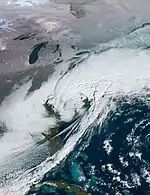 | |
| Duration | January 3–4, 2022 |
|---|---|
| Maximum snow | 15.5 in (39 cm) |
| Fatalities | 5 |
| Damage | Per Aon: $495 million (2022 USD)[57] |
A nor'easter exited the east coast of the United States on January 4, producing snowfall from Alabama to New England, with as much as 6.0 inches (15 cm) accumulating in Huntsville, Alabama and 6.9 inches (18 cm) falling at Ronald Reagan Washington National Airport.[58][59] A peak snowfall accumulation of 15.5 in (39 cm) was recorded in Huntingtown, Maryland.[60] Many vehicles and motorists across Interstate 95 in Virginia were stranded due to the snow, with some of them for 24 hours. Over 1,000 motor crashes were also reported and assisted by the state's police. It also caused 3 people to die in a car crash in Maryland.[61] Two others died in the winter storm, one each in Tennessee and Georgia, bringing the total up to 5.[62] Snow even fell as far south as Fort Walton Beach, Florida, where temperatures dropped from 75 °F (24 °C) to 34 °F (1 °C).[63] Thousands of flights were canceled in the eastern United States.[64] At the Baltimore Washington International Airport, a ground stop was temporarily instituted.[65] This storm came after a day of record high temperatures; the temperature in Huntsville, Alabama the day before the storm (January 1) was 79 °F (26 °C), a record for January.[66] The winter storm was unofficially named Winter Storm Frida by The Weather Channel.[67] It also caused 343,000 power outages in Virginia and 42,000 in Maryland.[68] North-central, northeast and northwest portions of Georgia were placed under winter storm warnings by the National Weather Service there on 1 January.[69] Mccaysville registered an unnoficial snow accumulation of 4.5 inches (11 cm), followed by Blue Ridge at 4.0 inches (10 cm).[70] Some of the areas of the state also saw power outages.[71] Winter alerts were also placed over some areas of the state. Over 59,000 household customers lost electricity across Charlotte City, with 159,000 overall over the Carolinas. Some establishments were completely wrecked by the strong winds the storm brought, and trees were reported to have been downed.[72][73] This further rose to 211,000 by 3 January and lessened to 2,500 as rescue teams started working to restore electricity.[74] In Ellendale, Delaware, 14.5 inches (37 cm) of snow fell on 3 January.[75] This led to a chicken house collapse on 4 January which trapped a 12-year-old girl.[76] Due to hazardous conditions, speed limits on parts of the Garden State Parkway and New Jersey Turnpike were reduced to 45 mph (72 km/h), while the speed limit was reduced to 35 miles per hour (56 km/h) on the Delaware Memorial Bridge.[77] Parts of U.S. Route 40 in Egg Harbor Township, New Jersey shut down due to flooding.[78] In addition, the Atlantic City International Airport to close for 7 hours.[79] Unusually, the nor'easter struck with very little warning and produced little to no snow north of Philadelphia and Toms River, New Jersey.[80] Further south, flooding occurred in Durham, North Carolina due to 3 inches (7.6 cm) of rain.[81] According to Aon Bonfield, damage from the storm reached $495 million.[57]
Farther north, in Iceland, news about the storm were dispatched across the country's people as a preparation.[82] The south and western parts of Iceland were also placed under an orange warning by the Icelandic Meteorological Office by 5 January.[83] The Icelandic Coast Guard also alerted vessels and fishermen in ports regarding the brunt of it.[84] Icelandair also canceled some flight operations by that day owing to the storm.[85] In the southwest portion of the country, rescue teams were reported to have been responding to the calls by the citizens there regarding the impact of the storm. Across Reykjavík, they responded to flying roofs of different houses and establishments. Suðurnes (Southern Peninsula) and Vestmannaeyjar (Westman Islands) were also severely affected. A hut was also blown away by strong winds in Vatnsleysuströnd.[86] The country's eastern portion meanwhile, was battered by rough waves from the storm. Harbours at Hafnarhólmur sustained "biggest" damages, as well as some vessels docked there. Rocks from the shores also pushed over the area's roadways; this was cleaned up subsequently.
Second storm (January 4–7)
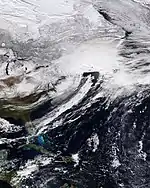 | |
| Duration | January 4–7, 2022 |
|---|---|
| Lowest pressure | 968 mb (28.59 inHg) |
| Maximum snow | 17.7 in (45 cm) |
| Fatalities | 1 |
| Damage | Unknown |
A winter storm, unofficially named Winter Storm Garrett by The Weather Channel impacted the Ohio Valley and Northeastern United States starting on January 6.[87][88][89] The storm dropped nearly ten inches of snow on Lexington, Kentucky, causing 250 car crashes which led to 18 injuries.[90] Portions of Interstate 64 closed down.[91] Nashville saw 6.3 inches (16 cm), which is more than an average years winter. Snow fell at two inches per hour. Freezing rain also fell in the Memphis metropolitan area.[92] The storm also dropped 6+ inches of snow on the eastern New York metropolitan area, with the city center receiving 5.8 inches (15 cm). Parts of Connecticut saw over a foot of snow and of Long Island saw up to 9.3 inches (240 mm) of snow,[93] with LaGuardia Airport recording 9.7 inches (25 cm).[94] Meanwhile, parts of the Philadelphia metro area saw 3–5 inches (7.6–12.7 cm) of snow.[95] Meanwhile, further north, parts of southeastern Massachusetts got hit with up to 13 inches (33 cm) of snow, with the city of Boston itself seeing 11.7 inches (30 cm).[96] A car crash on Massachusetts Route 140 caused one fatality.[97]
January cold wave
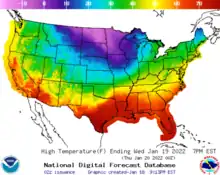
Throughout the month of January, temperatures frequently were below-average in much of the Eastern United States. On January 11, the coldest air in 3 years came down on the Northeastern United States. The Interstate 95 corridor had wind chills dip below 0 °F (−18 °C), while it dipped in the -30s Fahrenheit in interior New York and Maine.[98] On January 15, the cold wave strengthened, giving New York City the coldest day of the year, with a high of only 21 °F (−6 °C) and a low of only 10 °F (−12 °C), making the low the coldest reading in Central Park since January 31st, 2019.[99] This was after January 14 was slightly above average, with temperatures at 43 °F (6 °C).[100] In Syracuse, New York, the high was only 6 °F (−14 °C). January 2022 was Syracuse's first time in ten months having a below average month, and like in New York City, the day before had a slightly above average high of 36 °F (2 °C).[101] Burlington, Vermont had a wind chill as low as −32 °F (−36 °C) at 2:52 am on January 15.[102] January 15 saw temperatures dip down as low as −44.4 °C (−47.9 °F) in parts of Quebec and −40.6 °C (−41.1 °F) in parts of Ontario. Toronto dipped down to −21.1 °C (−6.0 °F), Quebec City got down to −28.0 °C (−18.4 °F), Montreal dipped down to −25.7 °C (−14.3 °F), and Ottawa saw temperatures as low as −26.8 °C (−16.2 °F).[103] A week later, Lopez, Pennsylvania got as low as −24 °F (−31 °C) on January 22.[104] That day, Canaan Valley, West Virginia set an all-time record low of −31 °F (−35 °C).[105] Quebec City tied an all time record low of −36.7 °C (−34.1 °F) on January 22 as well.[106] On that day, several record lows were set, including Houlton, ME, at −25 °F (−32 °C), and Massena, New York, at −29 °F (−34 °C).[107] International Falls, MN had a frigid high on January 25, at −7 °F (−22 °C).[108] On January 21, four Canadians froze to death just 40 feet (12 m) from the border with Minnesota with wind chill temperatures of −29 °F (−34 °C).[109] A fifth person died from a cold weather-related incident in New York, where the temperatures were −12 °F (−24 °C).[110] On January 21, an incident happened in a lake in Queens, NY when two people fell in the frozen lake, whereas the FDNY attempted to rescue the people that were stuck in the lake while using cold water gear.[111] It also caused West Palm Beach to reach 37 °F (3 °C), the coldest temperature recorded since 2010, and Vero Beach to tie their 1978 record low temperature at 30 °F (−1 °C) on the morning of January 30.[112] Syracuse saw 8 days below 0 °F (−18 °C), the most in 7 years.[113] Parts of Cuba get as low as 3.0 °C (37.4 °F) early on January 31.[114] January 2022 became the fifth coldest January in record at Covington, Virginia.[115]
Mid-January winter storm
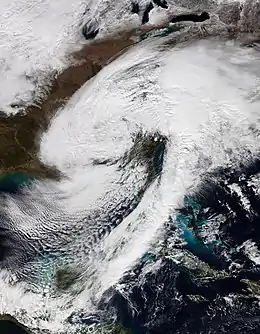 | |
| Duration | January 13–19, 2022 |
|---|---|
| Lowest pressure | 981 mb (28.97 inHg) |
| Maximum snow | 27.5 in (70 cm) |
| Fatalities | 5 fatalities |
| Damage | Per Aon: $600 million (2022 USD)[57] |
A weak area of low pressure developed on January 13 in southwestern Canada,[116] moving southeastwards into the High Plains while delivering heavy snowfall and began moving more southwards through the states of Nebraska, Kansas and Missouri into the early morning hours of January 14.[117] Later that day, at 21:00 UTC the Weather Prediction Center (WPC) began issuing periodic storm summary bulletins on the developing system, albeit with competing areas of low pressure.[118] Moving further south, a stronger low began forming over southern Missouri on January 15, moving into Arkansas and began strengthening due to a strong upper-level low located nearby.[119] Associated cold air in place over the aforementioned areas allowed snow to break out in areas further south, as the system began occluding later that night while wintry precipitation spread eastward towards the Southeastern United States into the early morning hours of January 16.[120] The system began turning more northward later that day into the southern Appalachian Mountains as the two centers began merging.[121]
The storm, unofficially named Winter Storm Izzy by The Weather Channel,[122] caused 11 inches (28 cm) of snow in Laurens, Iowa. There were also 78 car crashes reported, which caused 14 injures.[123][24] Georgia, Virginia, North Carolina and South Carolina all declared a state of emergency in preparation for the winter storm.[25]
Late January Southeast snowstorm
| Duration | January 19–22, 2022 |
|---|---|
| Fatalities | 1 fatality |
| Damage | Unknown |
A winter storm, unofficially named Winter Storm Jasper by The Weather Channel[124] impacted the southeastern United States in mid-to-late January and killed one person in North Carolina when an ambulance slid off the road.[125] The storm resulted in freezing rain, sleet, and snow across the Carolinas. The storm also closed hundreds of schools in Florida and Louisiana.[126] Parts of Virginia recorded up to 8.5 inches (22 cm) of snow.[127] In Pennsylvania, a Winter storm warning was issued in Pittsburgh and snow fell there as well.[128] The winter storm also forced a temporary ground stop at LaGuardia Airport.[129]
Late January blizzard
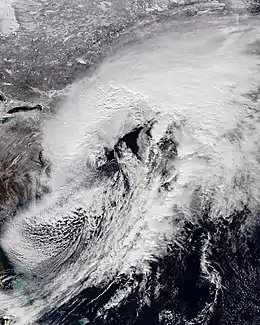 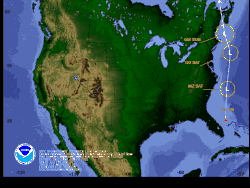 | |
| Duration | January 27–30, 2022 |
|---|---|
| Lowest pressure | 969 mb (28.61 inHg) |
| Maximum snow | 35.7 in (91 cm) |
| Fatalities | 4 fatalities (2 direct, 2 indirect) |
| Damage | Per Aon: $50 million (2022 USD)[57] |
A blizzard, unofficially named Winter Storm Kenan by The Weather Channel[130] caused widespread and significant conditions on the East Coast of the United States from January 27–30.
Winter storm warnings and blizzard warnings were issued for large swaths of the Northeast and New England, as blizzard conditions were expected to occur closer to the coastal areas of the region.[131] Approximately 1,200 flights nationwide were cancelled ahead of the storm. New York governor Kathy Hochul on January 28 urged residents, particularly those further east in the Long Island region, to prepare for high winds, power outages and near-blizzard conditions.[132] People were also urged to not travel at the height of the storm. Hochul also ordered that state emergency assets be ready in case the system tracked further west.[132] A "snow alert" was declared in New York City by the New York Department of Sanitation that day as well. On Long Island, Public Service Enterprise Group crews worked to cut tree branches in order to prevent power outages from snow weighing down on the branches and breaking.[132] In New Jersey, major roadways such as Interstate 95 and Interstate 78 were being brined by the New Jersey Department of Transportation since January 26.[133] The agency also stated that potential drivers should check their car settings and be prepared should the urgent need to travel arise.[133] Officials in Atlantic City announced a parking ban would go into effect at 5 p.m. on January 28, in addition to opening shelters. In Boston, Massachusetts, officials warned of up to 30 inches (76 cm) of snow through early on January 30.[134] Early on January 28, a Blizzard Warning was issued for Rhode Island and eastern Massachusetts.[135] The state of Virginia declared a state of emergency on January 27 in preparation for the storm system.[136]
Blizzard conditions were confirmed at multiple locations in New England, including Providence, Boston, and Worcester.[26] Boston recorded its snowiest day in January on record, and also tied its all time one-day snowfall record with the North American blizzard of 2003, with 23.5 inches (600 mm) of snow falling.[137] Providence broke its all time daily snowfall record set in 1961, with 18.8 inches (480 mm) of snow falling.[138]
Early February winter storm
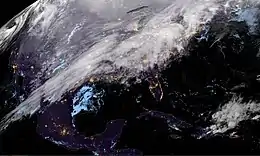 | |
| Duration | February 1–5, 2022 |
|---|---|
| Lowest pressure | 1004 mb (29.65 inHg) |
| Maximum snow | 37.5 in (95 cm) |
| Fatalities | 7 fatalities |
| Damage | Per Aon: $350 million (2022 USD)[57] |
A widespread, damaging and severe winter storm affected a wide swath of most of the United States with widespread wintry precipitation, spreading from Texas all the way northeast to Maine in early February 2022.[139][140][141] Nineteen states in the U.S. received impacts from the system, with more than 90 million people that were in the storm's path.[27] The winter storm was unofficially named Winter Storm Landon by The Weather Channel and was also referred to by other media outlets as the Groundhog Snowstorm, primarily due to the storm impacting on Groundhog Day.[142][143][144] The National Weather Service issued winter storm watches from Wyoming to Maine.[145] Winter Storm Warnings were also issued from New Mexico to Maine, and at least 18 states were under winter storm warnings.[146][147] In northeastern Ohio, and Buffalo, New York, snow amounts of more than a foot were forecasted.[148][149][150] Amtrak cancelled or modified the routes several trains due to the storm.[151][152]
Due to wintry conditions across Dallas, Texas, Dallas/Fort Worth International Airport was closed on February 3.[153] 1 person was killed in Dallas, primarily when a semi-truck crashed while traveling on I-45 while traveling over I-30, an additional dog died in the crash as well.[154] Three inches of snow were reported in Nashville, Tennessee, as well as 2 additional inches in Little Rock, Arkansas and Mayfield, Kentucky.[155] Over 120,000 people lost power in Shelby County, Tennessee.[156] On I-10 near Kerrville, Texas, several semi-trucks were jackknifed, causing drivers to be stranded on the interstate for hours.[157][158] A truck driver died on I-35 in Oklahoma after losing control on an icy part of the road.[159] A person in Oklahoma died after crashing in an ATV on a snow-covered road.[160] Ice impacts reached as far south as Corpus Christi, Texas.[161]
Late February winter storm
A very large winter storm affected 265 million people towards the end of February. Portions of Interstate 5 in California were closed as a result of the snow.[162] Record breaking snow in Flagstaff, Arizona also forced a closure on Interstate 40.[163] In Wichita Falls, Texas, temperatures fell from 77 °F (25 °C) on Monday to the teens by Wednesday, with sleet falling.[164] Austin saw their largest 24 hour temperature drop on record, from 88 °F (31 °C) to 32 °F (0 °C), from Tuesday to Wednesday.[165] A fatal car crash in Tennessee killed one person.[166] There was also a child who died on a frozen bridge in Kentucky. There were also 52 injuries in Missouri due to a combined 402 car crashes. 33,000 customers in Arkansas, and 15,000 in Tennessee lost power.[167] The Missouri car crashes caused 4 deaths.[168] In the Northeast, temperatures fell from nearly 70 °F (21 °C) on Wednesday to the 30s Fahrenheit by Friday.[164] In fact, Bangor, Maine even set a record February temperature on February 23, 2022, at 65 °F (18 °C), and Islip, New York tied their monthly record high of 68 °F (20 °C),[169][170] although the monthly record in Islip would be broken on February 16, 2023.[171] Bath, Pennsylvania saw 0.6 inches (1.5 cm) of freezing rain, while Mooers, New York had 12 inches (30 cm) of snow, Madison, New Hampshire had 11.5 inches (29 cm) of snow, and Boston had 8.5 inches (22 cm) of snow.[172] A seventh fatality occurred in a 30 car pileup on Interstate 89 in Milton, Vermont.[173]
Mid-March winter storm and cold wave
A winter storm developed on March 9 as a shortwave trough over the High Plains and Midwest before moving eastward and dropping moderate to heavy accumulations across the region from March 9–10. It was unofficially named Winter Storm Quinlan by the Weather Channel.[174] On March 12, snow got over 10.0 inches (25 cm) in the interior and a dusting on the Interstate 95 corridor, and a 73 car pileup in Pennsylvania caused ten injuries.[29] Over 143,000 customers lost power.[175] Heavy snow in the Pittsburgh metropolitan area forced speed restrictions on Interstate 70 and Interstate 79.[176] Rockwood, Maine saw the peak of 14 inches (36 cm). Snow even fell as far south as Louisiana and Mississippi, but quickly melted.[177] High winds at High Point Monument reached 82 mph (132 km/h), faster than any gust during Hurricane Sandy at that location,[178] while in Ocala, Florida, a tornado touched down, which was rated EF1.[179] The strong winds also resulted in the upper level of the Verrazzano-Narrows Bridge being closed.[180]
Following that an arctic cold wave from Canada went as far south as Texas and Georgia, causing record-breaking low temperatures for the month of March in many areas in the eastern half of the U.S. However, before moving east, the arctic air also caused Casper, Wyoming to set an all time record low for the month of March, at −25 °F (−32 °C).[181] Tupelo, Mississippi was predicted to get colder then Anchorage, with a low of 20 °F (−7 °C).[182] Pittsburg had a low of 9 °F (−13 °C) on March 13.[183] Parts of Wisconsin reached −8 °F (−22 °C).[184] Meanwhile, Jacksonville, Florida saw a record low of 30 °F (−1 °C). Wind chills dipped as low as 22 °F (−6 °C).[185] The lowest temperature in Tennessee during the event is −4 °F (−20 °C).[186]
Late March Northeast cold snap
A rare springtime cold wave affected the Northeastern United States at the end of March, following an arctic front moving in the night of March 27 into the morning of March 28. The high in New York City of 33 °F (1 °C) on March 28 is a record low high temperature, which was the coldest high temperature for Central Park this late in the year since April 7, 1982, when the high reached 30 °F (-1 °C).[187][188] This is also lower than the typical winter high of 39 °F (4 °C) in January.[189] LaGuardia Airport, as well as Bridgeport, Connecticut, saw highs as low as 32 °F (0 °C).[190] Philadelphia also got close to breaking record cold highs, with highs of 36 °F (2 °C). The lows dipped down into the 20s for 3 nights, and winds gusted as high as 30 miles per hour (48 km/h).[191][192] In Stroudsburg, Pennsylvania, the high of 28 °F (−2 °C) was the coldest high temperature so late in the season.[193] Hamilton, Ontario had its coldest high on March 28 since 1923, at only −4.7 °C (23.5 °F).[194] In Massachusetts, Boston tied a record low high of only 33 °F (1 °C), and in Worcester, the high only reached 27 °F (−3 °C), one degree below the previous record.[195] Wind chills in Worcester got as low as −1 °F (−18 °C).[196] The wind chill high in Toronto only reached −16 °C (3 °F), and the actual high only hit −6 °C (21 °F).[197] The humidity was very low, with a dew point of 0 °F (−18 °C) in Lehigh Valley.[198]
Despite the low humidity, however, the cold wave also brought a snow squall, which, in Schuylkill County, Pennsylvania, caused a car crash on Interstate 81, killing six people and hospitalizing 24 others.[199] Despite 15 snow squall warnings being issued, none were issued in the area of the crash due a gap in radar coverage.[200] Then lieutenant governor and current senator John Fetterman tweeted out his condolences to the people affected in the crash and his gratitude to the first responders who dealt with the situation that day.[201] The cold lingered into March 29, when Boston had a high of only 37 °F (3 °C).[202] Some parts of the New York Metropolitan Area tie record lows that morning, and JFK International Airport set a new record low of 24 °F (−4 °C).[203] Record lows stretched as far west as Youngstown, Ohio where a record low of 14 °F (−10 °C) occurred. [204] However, severe storms ended the cold snap by March 31.[202]
Mid-April blizzard
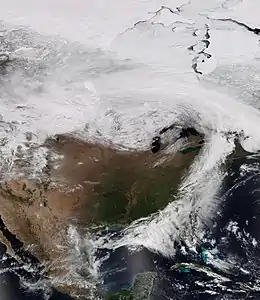 | |
| Duration | April 11–14, 2022 |
|---|---|
| Lowest pressure | 982 mb (29.00 inHg) |
| Maximum snow | 47 in (120 cm) |
| Fatalities | 1 fatalities |
| Damage | Unknown |
In mid-April, a powerful late-season blizzard, unofficially named Winter Storm Silas by The Weather Channel, hammered the southern areas of Canada and North Dakota, dropping as much as 40 inches (100 cm) of snow in some areas.[30]
On April 12, 2022, the National Hockey League announced that the upcoming Winnipeg Jets game against the Seattle Kraken, which was originally scheduled for April 13, has been postponed to May 1 as a winter storm swept through the southern area of Manitoba.[205] On April 13, a video is released of cattle in Douglas huddling together in the storm to protect their calves.[206] A low temperature record of Denver, Colorado was set due to this storm, at 11 °F (−12 °C), on April 13.[207] Several locations in Montana also had record low conditions across April 12 and 13.[208] In Elko, Nevada, a record low daily temperature of 7 °F (−14 °C) was set.[209] Also, in Elko, a daily maximum amount of 0.8 inches (2.0 cm) was set.[209] The storm caused Billings, Montana recorded their snowiest April day since 1955.[210] Pony, Montana saw 47 inches (120 cm) of snow. The blizzard caused Interstate 94 to be shut down between Jamestown, North Dakota and Glendive, Montana, US Route 83 to be closed from Bismarck, North Dakota to Minot, North Dakota, and US Route 85 to be closed from the South Dakota border to Amidon, North Dakota.[211] There was one fatality due to the blizzard in North Dakota.[30]
Mid-April nor'easter
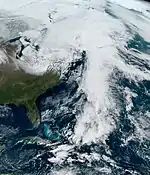 | |
| Duration | April 18–20, 2022 |
|---|---|
| Lowest pressure | 990 mb (29.23 inHg) |
| Maximum snow | 18 in (46 cm) |
| Fatalities | 1 fatalities |
| Damage | Per Aon: $25 million[212] |
Beginning early on April 18, a nor'easter began developing off the Southeastern United States, bringing heavy rain, wind and coastal flooding to much of the Mid-Atlantic states.[213] Further inland in areas like Pennsylvania, upper New York and Vermont, heavy snowfall fell of up to 6–12 inches (15–30 cm). In Annapolis, Maryland, a tree fell on a home, killing a person and injuring three others.[214] Between 3am and 9am, heavy rain on the Major Deegan Expressway caused all the southbound lanes to shut down.[215] Over 300,000 customers in the Northeast lost power, including 200,000 in New York.[216] Virgil, New York saw 18 inches (46 cm) of snow, while Montrose, Pennsylvania saw 14.5 inches (37 cm) of snow. Binghamton, which saw 14.2 inches (36 cm), realized its largest April snowstorm on record. From 12:30am to 4am on April 19, the NWS office in Boston lost power.[217][218] Meanwhile, farther south, heavy rain falls, with 2.09 inches (5.3 cm) in Central Park, 1.55 inches (3.9 cm) at JFK Airport, and 1.8 inches (4.6 cm) in Newark. Wind gusts along the South Shore of Long Island were over 50 miles per hour (80 km/h).[219] Two MLB games were postponed due to rain: at Citi Field between the New York Mets and San Francisco Giants,[220] and at Nationals Park between the Washington Nationals and Arizona Diamondbacks.[221] Meanwhile another game between the Cleveland Guardians and Chicago White Sox was postponed due to snow.[222] According to Aon Benfield, damage was $25 million.[212]
Late May winter storm
A very late-season winter storm, unofficially named Winter Storm Tad by The Weather Channel, affected the state of Colorado on May 20–21, 2022. A shortwave trough moved through the area, dumping up to 24 inches (61 cm) of snow in the state.[31] Some areas even received their heaviest snowfall for the month of May as a result, although Denver did not see a record-breaking amount. The winter storm followed on the heels of a large temperature drop throughout the state, following temperatures of near 90 °F (32 °C) the day before, with some areas like Denver seeing a 50 °F (28 °C) drop in that timeframe.[31] In Denver, as the front came through, the temperature dropped from 85 °F (29 °C), to 59 °F (15 °C), in 23 minutes.[223] The highest accumulations in Colorado were 11.4 inches (29 cm), while it was 11 inches (28 cm) in Montana.[224] The winter storm caused 100,000 customers to lose power.[225] In addition, over 600 flights were delayed and over 300 more were cancelled.[226] The low on May 21 in Denver was a record tying 31 °F (−1 °C).[227] While Wyoming did not see as much snow, several locations saw record low temperatures on May 21, and with a low of 26 °F (−3 °C) on May 22, Cheyenne also set a record low that day, although Cheyenne missed a record low on May 21. The second half of May was the coldest since 1951 in the area.[228] An MLB game between the New York Mets and the Colorado Rockies was postponed due to the intolerable conditions.[229]
Related events
Late October nor'easter
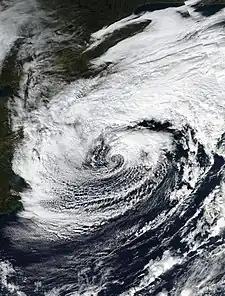
A strong nor'easter in late October brought high winds, cutting power to more than 600,000 people in New England. Category 3 hurricane-force wind gusts of 113 mph (182 km/h) were recorded in Truro, Massachusetts, 103 mph (166 km/h) in Duxbury, Massachusetts, and 97 mph (156 km/h) in Wellfleet, Massachusetts.[230][231][232][233] Martha's Vineyard, Massachusetts reported a wind gust to 94 mph (151 km/h) and Scituate reported a gust of 87 mph (140 km/h).[234] Unofficial wind gusts of 110 mph (180 km/h) in Wellfleet and 107 mph (172 km/h) in Provincetown, Massachusetts were recorded at exposed coastal locations.[235][236]
A plane was damaged at the New Bedford Regional Airport after being blown off the runway. In Hingham, a large tree brought down wires.[234] According to Aon Benfield, damage was estimated at over $200 million (2021 USD).[237] The system would later move out to sea and acquire subtropical characteristics, becoming Subtropical Storm Wanda on October 31, later becoming a full-fledged tropical cyclone two days later. The precursor of Wanda caused a lot of flooding in the tri-state area with heavy amounts of rain, which killed two people.
Season effects
This is a table of all of the events that have occurred in the 2021–22 North American winter. It includes their duration, damage, impacted locations, and death totals. Deaths in parentheses are additional and indirect (an example of an indirect death would be a traffic accident), but were still related to that storm. All of the damage figures are in 2022 USD.
| Regional Snowfall Index scale | |||||
| C0 | C1 | C2 | C3 | C4 | C5 |
| Event name |
Dates active | RSI category | RSI value | Highest gust mph (km/h) |
Minimum pressure (mbar) |
Maximum snow in (cm) |
Maximum ice in (mm) |
Areas affected | Damage (2022 USD) |
Deaths |
|---|---|---|---|---|---|---|---|---|---|---|
| Mid-October winter storm | October 12 – 14 | N/A | N/A | 84 (135) | 988 | 28 (71) | N/A | Intermountain West, Northern Plains, Canadian Prairies | $50 million | None |
| October 2021 Northeast Pacific bomb cyclone | October 24 – 26 | N/A | N/A | 159 (256) | 942 | 42 (110) | N/A | Alaska, Western United States, Western Canada | >$400 million | 2 |
| December tornado outbreak and winter storm | December 9 – 12 | N/A | N/A | Unknown | 974 | 36 (91) | N/A | Western United States, Central United States, Midwestern United States, Eastern United States, Eastern Canada | Unknown | None |
| January 3-4 nor'easter | January 3-4 | Category 1 | 2.325 | N/A | N/A | 15.5 (39) | N/A | Mid-Atlantic United States | $495 million | 5 |
| January 4-7 nor'easter | January 4-7 | Category 2.325 | 1 | N/A | 968 | 17.7 (45) | N/A | Tennessee, Kentucky, Northeastern United States | Unknown | 1 |
| Mid-January winter storm | January 13 – 17 | Category 2 | 3.407 | 91 (146) | 981 | 27.5 (70) | 0.50 (12.7) | South-central Canada, Northwestern United States, High Plains, Central, Southeastern United States, Northeastern United States | $600 million | 5 |
| Late January blizzard | January 27 – 30 | Category 1 | 2.295 | 99 (159) | 969 | 35.7 (91) | N/A | Southeastern United States, Northeastern United States, Atlantic Canada | $50 million | 4 |
| Early February winter storm | February 1 – 5 | Category 2 | 5.476 | Unknown | 1004 | 37 (94) | 0.80 (20) | Central United States, Eastern United States, northern Mexico, Atlantic Canada | $250 million | 7 |
| Mid-March winter storm | March 9 – 13 | N/A | N/A | Unknown | Unknown | 20 (51) | N/A | Western United States, Central United States, Eastern United States, Atlantic Canada | Unknown | 0 |
| Mid-April blizzard | April 11 – 14 | N/A | N/A | Unknown | 982 | 47 (120) | N/A | Western United States, Atlantic Canada | Unknown | 1 |
| April 2022 nor'easter | April 18-19 | N/A | N/A | N/A | 990 | 18 (46) | N/A | Northeastern United States | $25 million | 1 |
| Late May winter storm | May 20–21 | N/A | N/A | Unknown | Unknown | 24 (61) | N/A | Western United States | Unknown | Unknown |
| Season aggregates | ||||||||||
| 4 RSI storms | October 12 – May 21 | 942 | 60 (150) | 0.80 (20) | ≥ $1.97 billion | 26 (10) | ||||
See also
References
- "Earth Seasons". www.webcitation.org. Archived from the original on 2019-10-15. Retrieved 2020-10-16.
- "Meteorological vs. Astronomical Seasons". NOAA National Centers for Environmental Information. June 21, 2013. Archived from the original on November 25, 2021. Retrieved July 3, 2015.
- Lam, Linda (October 13, 2021). "Late-Fall, Winter Temperature Outlook: Shift to Warmer Southern Tier, Cooler Northern Tier Expected". www.weather.com. Archived from the original on October 23, 2021. Retrieved October 24, 2021.
- Blackwell, Jasmine (October 21, 2021). U.S. Winter Outlook: Drier, warmer South, wetter North with return of La Nina (Report). Washington, D.C.: National Oceanic and Atmospheric Administration. Archived from the original on October 21, 2021. Retrieved October 21, 2021.
- Asherman, Jacob (October 14, 2021). Storm Summary Number 2 for Intermountain West to Northern Plains Winter Storm (Report). College Park, Maryland: Weather Prediction Center. Archived from the original on October 16, 2021. Retrieved October 16, 2021.
- Puleo, Mark (October 12, 2021). "87 ultramarathoners rescued from 'scary' wintry conditions". Accuweather. Archived from the original on October 17, 2021. Retrieved October 16, 2021.
- Global Catastrophe Recap: October 2021 (PDF) (Report). Aon Benfield Inc. October 2021. Archived (PDF) from the original on November 11, 2021. Retrieved November 28, 2021.
- Van Dam, Derek; Jones, Judson (November 11, 2021). "Blizzard warnings issued as upper Midwest snowstorm begins to strengthen". CNN. Archived from the original on November 11, 2021. Retrieved November 11, 2021.
- December 2021 National Climate Report, NOAA
- "Winter heatwave breaks records in four US states | US weather | the Guardian".
- "CW3E Event Summary: 10-14 December 2021". Center for Western Weather and Water Extremes. December 16, 2021. Archived from the original on December 27, 2021. Retrieved December 26, 2021.
- "Storm Summary Number 6 for Western and Central U.S. Major Winter Storm System". Weather Prediction Center. December 15, 2021. Archived from the original on December 27, 2021. Retrieved December 26, 2021.
- Graff, Amy (Dec 16, 2021). "Atmospheric river is a win for California: Snowpack goes from 19% to 83% of average". SFGate. Archived from the original on December 26, 2021. Retrieved Dec 26, 2021.
- Romero, Dennis (December 27, 2021). "Snow expected to continue as winter storm warnings extend from Seattle to San Diego". CNBC. Archived from the original on January 14, 2022. Retrieved January 13, 2022.
- Clarridge, Christine (December 31, 2021). "From record high temperatures to bitter cold days, Western Washington's year of extreme weather". The Seattle Times. Archived from the original on January 15, 2022. Retrieved January 13, 2022.
- Seattle experiences coldest day in 31 years, King5, December 28, 2021
- Patrick, Anna (January 1, 2022). "Substantial snowfall not likely for Seattle this weekend". The Seattle Times. Archived from the original on January 14, 2022. Retrieved January 13, 2022.
- Mittendorf, Robert (December 30, 2021). "Overnight snow complicates Whatcom commute. Here's what's coming for the weekend". The Bellingham Herald. Retrieved January 13, 2022.
- Seattle-area sets mark for longest snowy period in 52 years, MyNorthwest, December 31, 2021
- "Extreme weather affecting highways across the state". WSDOT Blog. Washington State Department of Transportation. January 7, 2022. Archived from the original on January 14, 2022. Retrieved January 13, 2022.
- Zhou, Amanda; Romano, Benjamin (January 9, 2022). "Snoqualmie Pass is open with two narrow lanes to freight travel after more than three days of closure". The Seattle Times. Archived from the original on January 14, 2022. Retrieved January 13, 2022.
- Vancouver saw its coldest temperature in over half a century this winter (INFOGRAPHICS), Vancouver Is Awesome, December 30, 2021
- BREAKING! Falcon Lake, Texas, +37,2°C / 99°F: the highest January temperature in US history!, Mkweather, January 2, 2022
- "75 million Americans under alert for winter storm, chilling temperatures". ABC News. Archived from the original on 15 January 2022. Retrieved 15 January 2022.
- "Winter Storm Izzy: Hundreds of Flights Canceled, Several States Declare Emergencies". The Weather Channel. Archived from the original on 2022-01-16. Retrieved 16 January 2022.
- @NWSBoston (29 January 2022). "Blizzard conditions confirmed at several locations today. See the following public information statement for more d…" (Tweet) – via Twitter.
- "Major winter storm set to bury Midwest in snow, unleash hazardous trail of ice". AccuWeather. 1 February 2022. Archived from the original on 1 February 2022. Retrieved 1 February 2022.
- At minus 91 degrees, Alaska's feels-like temperature was colder than the state's all-time record low, Fox Weather, February 7, 2022
- Rosenthal, Zachary. "Winter roars back in Northeast with heavy snow, record-challenging chill". AccuWeather. Retrieved March 14, 2022.
- "Killer 3 Day Blizzard Pummels North Dakota, Leaving 1 Dead". Y105FM. Retrieved April 19, 2022.
- "Spring storm set some records, busted others". 24 May 2022.
- LoBiondo, Nicole (June 20, 2022). "Late-season snow and cold give parts of Northeast a taste of winter". AccuWeather. Retrieved June 25, 2022.
- "PUBLIC INFORMATION STATEMENT NATIONAL WEATHER SERVICE CARIBOU ME 647 PM EDT SUN JUN 19 2022". National Weather Service. June 19, 2022. Retrieved July 23, 2022.
- "WPC surface analysis valid for 10/10/2021 at 03 UTC". Weather Prediction Center. October 10, 2021. Archived from the original on December 15, 2021. Retrieved December 14, 2021.
- "WPC surface analysis valid for 10/11/2021 at 12 UTC". Weather Prediction Center. October 11, 2021. Archived from the original on October 17, 2021. Retrieved October 17, 2021.
- "WPC surface analysis valid for 10/12/2021 at 12 UTC". Weather Prediction Center. October 12, 2021. Archived from the original on October 17, 2021. Retrieved October 17, 2021.
- "WPC surface analysis valid for 10/13/2021 at 06 UTC". Weather Prediction Center. October 13, 2021. Archived from the original on October 17, 2021. Retrieved October 17, 2021.
- "WPC surface analysis valid for 10/13/2021 at 21 UTC". Weather Prediction Center. October 13, 2021. Archived from the original on October 17, 2021. Retrieved October 17, 2021.
- Asherman, Jacob (October 13, 2021). Storm Summary Number 1 for Intermountain West to Northern Plains Winter Storm (Report). College Park, Maryland: Weather Prediction Center. Archived from the original on October 17, 2021. Retrieved October 17, 2021.
- "WPC surface analysis valid for 10/14/2021 at 09 UTC". Weather Prediction Center. October 14, 2021. Archived from the original on October 17, 2021. Retrieved October 17, 2021.
- "WPC surface analysis valid for 10/15/2021 at 00 UTC". Weather Prediction Center. October 15, 2021. Archived from the original on October 17, 2021. Retrieved October 17, 2021.
- "WPC surface analysis valid for 10/15/2021 at 12 UTC". Weather Prediction Center. October 15, 2021. Archived from the original on October 17, 2021. Retrieved October 17, 2021.
- Fries, Tynin (October 14, 2021). "Colorado snow totals for Oct. 13–14, 2021". Denver Post. Archived from the original on November 25, 2021. Retrieved October 16, 2021.
- Eggen, Lukas; Dylan, Johah (October 12, 2021). "October storm brings strong winds, showers to Las Vegas". Review-Journal. Archived from the original on October 16, 2021. Retrieved October 16, 2021.
- LaChance, Brendan (October 13, 2021). "Casper area records as much as 17.4 inches of snow; 20% chance of more on Thursday". Oil City News. Archived from the original on October 16, 2021. Retrieved October 16, 2021.
- Zammit, David (October 14, 2021). "Warm Weather to Upend Brief Snowfall". SwiftCurrent Online. Archived from the original on October 17, 2021. Retrieved October 17, 2021.
- Global Catastrophe Recap October 2021 (PDF) (Report). Aon. November 11, 2021. pp. 4–5. Archived (PDF) from the original on November 11, 2021. Retrieved November 22, 2021.
- "Take this seriously': New York, New Jersey declare emergencies as California 'bomb cyclone' storms move east". USA Today. 27 January 2022. Archived from the original on 9 January 2022. Retrieved 27 January 2022.
- Matt Zaffino (October 28, 2021). "Bomb cyclone: What it is, where the term came from and why it's not a hurricane". KGW8. Archived from the original on November 4, 2021. Retrieved November 4, 2021.
- "NW 'bomb cyclone' winds toppled tree that killed mother, son -- 'It's a freak accident'". oregonlive.com. The Associated Press. October 27, 2021. Archived from the original on November 4, 2021. Retrieved November 4, 2021.
- Paul Duginski (October 29, 2021). "How did California's recent bomb cyclones compare with the 'Big Blow' of 1962?". Los Angeles Times. Archived from the original on November 4, 2021. Retrieved November 4, 2021.
- "Winter Storm Atticus Dumped Up to 21 Inches of Snow in the Twin Cities; Great Lakes Damaging Wind Threat". weather.com. The Weather Company. December 11, 2021. Archived from the original on December 10, 2021. Retrieved December 12, 2021.
- Morgan, Leigh (October 14, 2021). "Weather Channel rolls out its winter storm names". AL.com. Archived from the original on December 9, 2021. Retrieved December 9, 2021.
- Jan Wesner Childs (December 11, 2021). "Dozens Dead, Injured After Historic Tornado Outbreak". weather.com. The Weather Company. Archived from the original on December 11, 2021. Retrieved December 12, 2021.
- "Minnesota Weather: South Metro Gets 12+ Inches Of Snow; More Expected Overnight". CBS Minnesota. December 10, 2021. Archived from the original on December 11, 2021. Retrieved December 11, 2021.
- "Storm bringing snow, strong winds to southern Minnesota, northern Iowa". KIMT. KIMT. Archived from the original on December 12, 2021. Retrieved December 12, 2021.
- Q1 Global Catastrophe Recap, Aon, April 2022
- Barnett, Carson Meredith and Jessica. "Snow totals reach as high as 7 inches in North Alabama". Allen Media. Archived from the original on 2022-01-11. Retrieved 2022-01-09.
- "Snow totals: How much snow fell across the region and who got the most?". WTOP News. 2022-01-04. Archived from the original on 2022-01-09. Retrieved 2022-01-09.
- "Archived copy". Archived from the original on 2022-01-05. Retrieved 2022-01-05.
{{cite web}}: CS1 maint: archived copy as title (link) - Trujillo, Briana (January 3, 2022). "3 Killed in SUV, Snowplow Crash on Columbia Pike in Montgomery County". NBC 4 Washington. Archived from the original on January 4, 2022. Retrieved January 4, 2022.
- Jenkins, Cameron (January 4, 2022). "5 dead, hundreds stranded in winter storm". The Hill. Archived from the original on February 4, 2022. Retrieved February 4, 2022.
- Say it ain't snow: Flakes fall in Florida after 40-degree temperature drop, Fox Weather, January 3, 2022
- "Archived copy". www.usnews.com. Archived from the original on 2022-01-05.
{{cite web}}: CS1 maint: archived copy as title (link) - Flights Destined For BWI Thurgood Marshall Grounded Due To Weather, CBS News, January 3, 2022
- "Sneak attack storm bringing heavy snow, severe weather to Eastern U.S." Washington Post. ISSN 0190-8286. Archived from the original on 2022-01-30. Retrieved 2022-01-09.
- "Winter Storm Frida Causes Troubles from the Southeast to Mid-Atlantic". The Weather Channel. Archived from the original on 5 January 2022. Retrieved 5 January 2022.
- Heavy Winter Storm Hits D.C. Area and Knocks Out Power Across Southeast Archived 2022-01-07 at the Wayback Machine, New York Times, January 3, 2022
- Beesley, Ryan (2 January 2022). "North Georgia hit by snow flurries, heavy winds". FOX 5 Atlanta. Archived from the original on 3 January 2022. Retrieved 6 January 2022.
- "First snow of the season falls in North Georgia". 11Alive.com. 1 January 2022. Retrieved 6 January 2022.
- "Major winter storm causes turmoil throughout the US Capital Region". WSWB. Archived from the original on 5 January 2022. Retrieved 6 January 2022.
- "Winter storm brings heavy snow to NC mountains, Charlotte area sees wintry mix". wcnc.com. 2 January 2022. Archived from the original on 3 January 2022. Retrieved 6 January 2022.
- "Winter weather impacting Western North Carolina". WSPA 7News. 2 January 2022. Archived from the original on 2 January 2022. Retrieved 6 January 2022.
- "Power restored for most across N.C. after Monday's winter storm". spectrumlocalnews.com. Archived from the original on 4 January 2022. Retrieved 6 January 2022.
- "Ellendale ends up with highest snowfall total". 4 January 2022. Archived from the original on 2022-02-01. Retrieved 2022-02-01.
- "Two girls rescued after chicken house roof collapse in Ellendale". 5 January 2022. Archived from the original on 2022-02-01. Retrieved 2022-02-01.
- N.J. weather: Speeds reduced on Parkway, Turnpike due to snowstorm, NJ.com, January 3, 2022
- Route 40 Closed Due To Flooding In Egg Harbor Township, Patch, January 3, 2022
- "Atlantic City International Airport Reopens After Snow Storm". Patch. January 3, 2022. Retrieved July 25, 2023.
- "January 3, 2022: Winter Storm Hits Delmarva and South Jersey". National Weather Service. Retrieved April 23, 2022.
- Renshaw, jannett. "Winter storm pounds Washington as it moves across U.S. East Coast". Reuters. Retrieved April 23, 2022.
- "Gera ráð fyrir miklu álagi í nótt og í fyrramálið" [Expect heavy loads at night and in the morning]. Morgunblaðið (in Icelandic). 5 January 2022. Archived from the original on 6 January 2022. Retrieved 6 January 2022.
- "Appelsínugul viðvörun – fylgist með lægðinni ganga yfir" [Orange warning - monitors the depression walk over]. Morgunblaðið (in Icelandic). 5 January 2022. Archived from the original on 6 January 2022. Retrieved 6 January 2022.
- "Vont alls staðar en verst suðvestanlands" [Bad everywhere but worst in the southwest of the country]. Morgunblaðið (in Icelandic). 5 January 2022. Archived from the original on 5 January 2022. Retrieved 6 January 2022.
- "Icelandair fellir niður flug á fimmtudag" [Icelandair cancels flights on Thursday]. Morgunblaðið (in Icelandic). 4 January 2022. Archived from the original on 4 January 2022. Retrieved 6 January 2021.
- "Björgunarsveitir farnar að finna fyrir óveðrinu" [Rescue teams have begun to feel the effects of the storm]. Morgunblaðið (in Icelandic). 5 January 2022. Archived from the original on 6 January 2022. Retrieved 6 January 2022.
- "Winter Storm Could Snarl Travel From the South to the Mid-Atlantic and Northeast". The Weather Channel. Archived from the original on 2022-01-06. Retrieved 6 January 2022.
- "Winter storm takes aim at Mid-South, East Coast: Timeline of expected snow". KDFW. Fox News. 6 January 2022. Archived from the original on 6 January 2022. Retrieved 6 January 2022.
- "Battered East Coast braces for first potential bomb cyclone of new year as winter storm closes in". USA Today. Archived from the original on 6 January 2022. Retrieved 6 January 2022.
- Police have responded to nearly 250 road incidents Archived 2022-01-30 at the Wayback Machine, Lexington Herold Leader, January 7, 2019
- Winter storm leads to pileup involving up to 75 vehicles on Interstate 64 in Kentucky, NBC News, January 7, 2022
- "Winter Storm Garrett Blanketed the South, Appalachians, Northeast (RECAP)".
- SNOW How Much Snow Did You Get? Check Latest Totals Here Archived 2022-01-07 at the Wayback Machine, ABC 4 New York, January 7, 2022
- "How Much Snow Did You Get? Check Latest Totals Here". NBC New York. January 7, 2022. Retrieved January 15, 2023.
- Overnight storm brings snow to the Philly region. Here's how much snow fell. Archived 2022-01-07 at the Wayback Machine, Philadelphia Inquirer, January 7, 2022
- Snowfall totals: How much fell across Massachusetts? Archived 2022-01-07 at the Wayback Machine, WCVB 5, January 7, 2022
- Deadly Crash Among Dozens Reported Across Mass. During 2022's First Snowstorm, NBC Boston, January 7, 2022
- "Coldest air of the season hits Northeast, with wind chill well below zero". ABC 7. Retrieved April 19, 2022.
- Frydelwicz, Rob. "Today in New York Weather History: January 15". TypePad. Retrieved July 2, 2022.
- Miranda, Byron (January 14, 2022). "Chilly Friday before dangerous wind chills return at night, into Saturday". Pix11. Retrieved July 2, 2022.
- January 2022 is in the books. We all know it was cold, but how cold and snowy??, WYSR, January 31, 2022
- "Burlington's winter has been cold so far. Here's how this January compares to last".
- Quebec (-44,4°C) and Ontario (-40,6°C) after the strongest Arctic blast of the winter, Mkweather, January 17, 2022
- "Looking back at January's weather". 31 January 2022.
- West Virginia's Canaan Valley plummets to minus-31, setting record low for region, WV News, January 22, 2022
- Lowest Temperatures in Quebec City History, Extreme Weather Watch
- "Record Cold Temperatures in New England and the Northeast". 22 January 2022.
- "'Massive' swings in temperature set to continue across North Central states". AccuWeather. January 26, 2022.
- 4 people, including baby and teen, apparently freeze to death near U.S.-Canada border; Florida man charged with human smuggling Archived 2022-01-21 at the Wayback Machine, CBS News, January 21, 2022
- "College student dies after being found outside in extreme cold: Police". MSN.com. ABC News. Archived from the original on 29 January 2022. Retrieved 29 January 2022.
- "City firefighters enter ice-cold water to rescue pair who fell in Queens pond: FDNY". PIX11. 2022-01-21. Retrieved 2022-07-21.
- South Florida sees record-breaking temperatures Sunday morning Archived 2022-01-30 at the Wayback Machine, WPBF 25, January 30, 2022
- "Was it a record? Syracuse sees several subzero days this season".
- "Cubans bundle up against cold as temperatures plunge, winds roar". Reuters. 31 January 2022.
- January 2022 National Climate Report, NOAA NCEI
- "WPC Surface Analysis for 01/13/22 at 09 UTC". Weather Prediction Center. January 13, 2022. Archived from the original on January 18, 2022. Retrieved January 16, 2022.
- "WPC Surface Analysis for 01/14/22 at 06 UTC". Weather Prediction Center. January 14, 2022. Archived from the original on January 16, 2022. Retrieved January 16, 2022.
- "Storm Summary Number 01 for Northern Plains through Midwest Winter Storm". Storm Summary Message. College Park, Maryland: National Weather Service's Weather Prediction Center. January 14, 2022. Archived from the original on January 17, 2022. Retrieved January 16, 2022.
- "Storm Summary Number 03 for Northern Plains through Mississippi Valley Winter Storm". Storm Summary Message. College Park, Maryland: National Weather Service's Weather Prediction Center. January 15, 2022. Archived from the original on January 17, 2022. Retrieved January 16, 2022.
- "Storm Summary Number 04 for Northern Plains through Mississippi Valley Winter Storm". Storm Summary Message. College Park, Maryland: National Weather Service's Weather Prediction Center. January 15, 2022. Archived from the original on January 16, 2022. Retrieved January 16, 2022.
- "Storm Summary Number 05 for Northern Plains, Mississippi Valley, and Central/Southern Appalachians Winter Storm". Storm Summary Message. College Park, Maryland: National Weather Service's Weather Prediction Center. January 16, 2022. Archived from the original on January 17, 2022. Retrieved January 16, 2022.
- "Winter Storm Izzy to Spread Mess of Snow, Ice from Midwest into South and East into MLK Weekend". The Weather Channel. Archived from the original on 2022-01-14. Retrieved 14 January 2022.
- "Tow bans issued for 21 Iowa counties as spotters report more than 7 inches of snow in Des Moines metro". Des Monies Register. Archived from the original on 18 January 2022. Retrieved 15 January 2022.
- "Winter Storm Jasper: Schools Closed from Texas to Florida Panhandle; Emergencies Declared in Virginia, Carolinas". The Weather Channel. Archived from the original on 2022-01-22. Retrieved 22 January 2022.
- "Rare blast of snow, ice takes aim at Southeast US coast". AP News. 21 January 2022. Archived from the original on 22 January 2022. Retrieved 22 January 2022.
- "Winter Storm Jasper Brings Ice to the Gulf, Atlantic Coasts, then Snow to the Carolinas (RECAP) | The Weather Channel - Articles from The Weather Channel | weather.com". The Weather Channel. Archived from the original on 2022-01-23. Retrieved 2022-01-23.
- "Mid-Atlantic Regional Climate Impacts Summary and Outlook: Winter 2021-2022". Mid Atlantic Regional Climate Center. Retrieved November 3, 2022.
- Dougherty, Ashley (2022-01-17). "Winter storm warning remains in effect, snow continues to fall". WTAE. Archived from the original on 2022-01-23. Retrieved 2022-01-23.
- Delays, cancelations reported at Northeast airports due to winter storm, Fox Weather, January 20, 2022
- "Winter Storm Kenan to Hit Parts of East Coast With Heavy Snow, Strong Winds and Coastal Flooding". The Weather Channel. Archived from the original on 2022-01-27. Retrieved 27 January 2022.
- Breslin, Maureen (January 28, 2022). "More than 70 million prep for 'bomb cyclone' winter storm". The Hill. Archived from the original on January 28, 2022. Retrieved January 28, 2022.
- Smith, Jeff (January 27, 2022). "New York area urged to prepare for snow, high winds in weekend nor'easter". ABC7 New York. Archived from the original on January 28, 2022. Retrieved January 28, 2022.
- "Major Preparations Underway At Jersey Shore, Philadelphia Region Ahead Of Winter Storm". January 28, 2022. Archived from the original on January 28, 2022. Retrieved January 28, 2022.
- "Coastal communities prepare for high winds and potential flooding from winter storm". The Boston Globe. Archived from the original on 2022-01-28. Retrieved 2022-01-28.
- "LexingtonMAwx on Twitter: "The Blizzard Warning for SNE has been expanded west from the immediate coast, now including all of eastern Mass and RI. #SNEwx #MAwx #RIwx". Archived from the original on 2022-01-28. Retrieved 2022-01-28.
- "Gov. Youngkin declares state of emergency as second weekend of winter weather approaches". Wavy. 27 January 2022. Archived from the original on 27 January 2022. Retrieved 28 January 2022.
- "Breaking: today was the snowiest January day on record in #Boston. Absolutely staggering snow total of 23.5 inches. Wow. Blizzard of '78 had "only" 21 inches in a calendar day on January 20". Twitter. MyRadar Weather. Retrieved 30 January 2022.
- "Even during the Blizzard of '78, we didn't have as much snow in one day as we did today. 18.8" fell at TF Green, breaking the old record of 18.3". The Blizzard of '78 record for 1 day snowfall is now 3rd at 18.0". The '78 storm is still #1". Twitter. Pinpoint Weather12. Archived from the original on 18 February 2022. Retrieved 30 January 2022.
- "Another Winter Storm To Bring Snow, Ice". MSN. 31 January 2022. Archived from the original on 30 January 2022. Retrieved 31 January 2022.
- "Winter Storm Landon Forecast to Create 2,000-Mile-Long Icy Corridor of Snow Across U.S.Winter Storm Landon Forecast to Create 2,000-Mile-Long Icy Corridor of Snow Across U.S." NewsWeek. 31 January 2022. Archived from the original on 31 January 2022. Retrieved 31 January 2022.
- "Latest on Winter Storm Landon's Snow, Ice Threats". The Weather Channel. 31 January 2022. Archived from the original on 31 January 2022. Retrieved 31 January 2022.
- "Groundhog Snowstorm Is Possible in the Plains, Midwest". The Weather Channel. 31 January 2022. Archived from the original on 31 January 2022. Retrieved 31 January 2022.
- "Groundhog Day 2022 Forecast: Will Punxsutawney Phil See His Shadow?". The Weather Channel. 31 January 2022. Archived from the original on 31 January 2022. Retrieved 31 January 2022.
- "Winter Storm Landon a Major Snow, Ice Threat to Intensify By Groundhog Day in Central, Eastern U.S." The Weather Channel. 31 January 2022. Archived from the original on 31 January 2022. Retrieved 31 January 2022.
- "The next winter storm takes aim at the South, while the Northeast digs out of last week's blizzard". CNN. 31 January 2022. Archived from the original on 31 January 2022. Retrieved 31 January 2022.
- "NWS - Watch, Warning, Advisory Display". Archived from the original on 2022-02-01. Retrieved 2022-02-15.
- "INDwxbrief". NWS. 1 February 2022. Archived from the original on 2 February 2022. Retrieved 1 February 2022.
- "Winter storm update: Landon could bring more than 8 inches of snow, ice and sleet to Northeast Ohio". Cleveland. 31 January 2022. Archived from the original on 31 January 2022. Retrieved 31 January 2022.
- "Winter Storm Landon could bring layer of ice and then a foot of snow Wednesday, Thursday". Mansfield News Journal. 31 January 2022. Archived from the original on 31 January 2022. Retrieved 31 January 2022.
- "Over a Foot of Snow Possible For Buffalo and Western New York". Country 106.5 WYRK. 31 January 2022. Archived from the original on 31 January 2022. Retrieved 31 January 2022.
- "Service Advisory Update: Due to impacts from the latest winter storm and for the safety of our customers and employees, the following temporary service adjustments are effective between Wednesday, February 2 – Friday, February 4". Twitter. Archived from the original on 2 February 2022. Retrieved 2 February 2022.
- "Modified Service Due to Winter Storm Landon". Twitter. Archived from the original on 3 February 2022. Retrieved 3 February 2022.
- "Dallas/Fort Worth International Airport". DallasNews. 3 February 2022. Archived from the original on 3 February 2022. Retrieved 3 February 2022.
- "Deadly 18-Wheeler Crash Closes Highway Overpasses in Downtown Dallas". NBCDFW. 3 February 2022. Archived from the original on 3 February 2022. Retrieved 3 February 2022.
- "Ice Storm Strikes Tornado-Ravaged Areas of Tennessee, Kentucky, Including Mayfield | The Weather Channel - Articles from The Weather Channel | weather.com". The Weather Channel. Archived from the original on 2022-02-03. Retrieved 2022-02-03.
- Roberson, Amber. "Memphis power outages: More than 120,000 without power in wake of ice storm". The Commercial Appeal. Archived from the original on 2022-02-03. Retrieved 2022-02-04.
- "Winter Storm Landon Live Updates: Hundreds Stranded on I-10 in Texas; Flight Cancellations Mount in Northeast". The Weather Channel. 4 February 2022. Archived from the original on 4 February 2022. Retrieved 4 February 2022.
- "Major accident in Kerrville causing huge delays Friday morning". Kens5. 4 February 2022. Archived from the original on 4 February 2022. Retrieved 4 February 2022.
- "Bucket truck driver dies in crash on I-35 in Oklahoma". KFOR-TV. NBC News. 4 February 2022. Archived from the original on 4 February 2022. Retrieved 4 February 2022.
- "Oklahoma teen dies in ATV crash". KFOR-TV. 5 February 2022. Archived from the original on 5 February 2022. Retrieved 5 February 2022.
- "Winter Storm Landon Sweeping Through the Northeast With Snow and Ice on Friday". The Weather Channel. 4 February 2022. Archived from the original on 4 February 2022. Retrieved 4 February 2022.
- ❄️I-5 CLOSED❄️, Celtrans District 7, Twitter
- Winter storm produces record-breaking snow in Flagstaff, Arizona, Fox Weather, February 23, 2022
- Sosnowski, Alex (February 24, 2022). "Gigantic winter storm spreading heavy snow, ice across 1,800-mile stretch of US". Retrieved June 18, 2022.
- Freezing Austin records biggest 24-hour temperature swing ever: 56-degree drop from 88 to 32, Austin-Ameican Statesmen, February 23, 2023
- "Winter storm related death confirmed in Tipton County". WREG-TV. 25 February 2022. Retrieved 3 March 2022.
- "Winter Storm Oaklee: Travel Advisory Issued for New York City; Child Dies in Crash on Icy Kentucky Bridge". The weather Channel. February 26, 2022. Retrieved June 18, 2022.
- At Least Six People Killed on Icy Roads During Winter Storm Oaklee, Weather Underground, February 26, 2022
- "The duality of Maine: record warmth Wednesday to a snow storm Friday". NWS Central Maine. February 24, 2022. Retrieved August 12, 2022.
- The 68° reading today actually ties the record for the month of February. On February 17, 1976 ISP recorded a 68° high temperature as well, National weather Service New York, NY, Twitter, February 23, 2022
- Islip and Bridgeport have both broken record high monthly temperatures for February. 71° at Islip breaks the record of 68 that was set in 1976 and 2022. 68° at Bridgeport breaks the record of 67 that was set in 1976, 1997, 2018 and 2022. #NYwx #CTwx, National Weather Service New York, NY, Twitter, February 16, 2023
- "Winter Storm Oaklee Spread Snow and Ice Into the Northeast". Weather Underground. February 25, 2022. Retrieved June 18, 2022.
- At least 1 person dead, 30 cars involved in interstate pileup in Milton, VTDigger, February 25, 2022
- Korosec, Marko (2022-03-09). "The Polar Vortex brings Winter Storm Quinlan with a major cold blast across much of the United States, becoming a monster Nor'Easter on Saturday". Severe Weather Europe. Retrieved 2022-03-12.
- "Strong Late-Winter Storm Knocks Out Power and Snarls Travel". The New York Times. March 12, 2022. Retrieved June 25, 2022.
- Storm drops up to 9 inches of snow in Pittsburgh region, creates road hazards, Triblive, March 12, 2022
- Winter roars back in Northeast with snow, record-challenging chill, UPI, March 13, 2022
- N.J. weather: Hurricane-force wind of 82 mph reported in Sussex County during fierce winter storm, NJ.com, March 12, 2022
- EF-1 tornado damages buildings, vehicles in Ocala, authorities say, Click Orlando, March 12, 2022
- NYC Weather: Worst of storm will be during afternoon hours; upper-level of Verrazzano-Narrows Bridge closed, Silive, March 12, 2022
- Staff, Oil City (March 10, 2022). "NWS: New all-time record low set for March in Casper".
- Rosenthal, Zachary. "Record-low temperatures could make Mississippi colder than Alaska". AccuWeather. Retrieved March 14, 2022.
- Storm, Jessica. "Temperatures to skyrocket in Northeast as wild temperature swings continue". AccuWeather. Retrieved March 14, 2022.
- "March 2022 Climate Summary". National Weather Service La Crosse, Wisconsin. National Weather Service. Retrieved November 3, 2022.
- "Record freezing start begins the bounce back". News4Jax. March 13, 2022. Retrieved June 25, 2022.
- "March 2022 Tennessee State Climate Summary" (PDF). Tennessee Climate Office. Retrieved November 3, 2022.
- "March 2022 Weather Recap: Somewhat Mild & Dry". New York City Weather Archive. Retrieved 2022-06-28.
- "Brutally cold weather in NYC". FOX 5 NY. 28 March 2022. Retrieved March 28, 2022.
- "Record-cold start to week in Northeast as temperatures plunge 15 to 30 degrees below average". Fox Weather. 24 March 2022. Retrieved March 28, 2022.
- Record-breaking chill: NYC high temps barely pass freezing Monday, top centuries-old marks, Silve, March 28, 2022
- "Snow showers and squalls are possible into Monday evening in the Philly area". Philadelphia Inquirer. Retrieved March 28, 2022.
- After three mornings in the 20s, by Thursday, highs will be in the 70s, Philadelphia Inquirer, March 29, 2022
- Monday's highs were record-cold in Stroudsburg, Mount Pocono, Mount Pocono, March 30, 2022
- Sager, Nathan (March 28, 2022). "Hamilton had its coldest March 28 in almost 100 years". Inthehammer. Retrieved June 25, 2022.
- Nunes, Rachel (March 28, 2022). "MA Ties, Breaks Records For Coldest March 28". Patch. Retrieved June 25, 2022.
- "Wind chills dip under zero degrees in some parts of Massachusetts as some cities break temperature records". Masslivw. March 28, 2022. Retrieved June 25, 2022.
- People are complaining about Toronto's cold snap that just set a 100 year weather record, bigTo, March 28, 2022
- Lehigh Valley weather: Spring? It’s going to feel like January on possibly record-setting day, Lehigh Valley Live, March 28, 2022
- "Six people killed in massive crash on Interstate 81 in Schuylkill County, Pennsylvania State Police say". WGAL. 30 March 2022. Retrieved 1 April 2022.
- Fatal I-81 accident: why wasn’t a snow squall warning issued?, ABC27, April 1, 2022
- Gisele and I express our *deepest* condolences over this morning’s horrific crash on Interstate 81 in Schuylkill County and gratitude to the first responders on the scene. Sending love to the families and victims affected by this tragedy., John Fetterman, Twitter, March 28, 2022
- Cold weather in the Northeast leaving as March turns to April?, AccuWeather, March 30, 2022
- NYC Cold Breaks Records Again Tuesday as Wintry Mix, Severe Storm Threat Loom, NBC New York, March 29, 2022
- Stutler, Hannah (December 29, 2022). "2022 in review: When were the warmest and coldest days of the year?". WKBN. Retrieved December 30, 2022.
- "Kraken-Jets game postponed due to winter storm". 12 April 2022.
- "Video captures cows huddled up to keep watch of their babies during the Manitoba storm". 13 April 2022.
- "National Weather Service Raw Text Product". Iowa Environmental Mesonet. Iowa State University. Retrieved April 13, 2022.
- "National Weather Service Raw Text Product". Iowa Environmental Mesonet. Iowa State University. Retrieved April 13, 2022.
- National Weather Service Raw Text Product, Iowa Environmental Mesonet
- "4/12 1130 AM: With the 10" measured at the airport in Billings already, and there will be more to that total by midnight, we have broken the record daily snow amount of 5.8" set back in 1991. This is also the snowiest April day in Billings since 1955. #MTwx". Twitter. National Weather Service. April 12, 2022. Retrieved April 13, 2022.
- Snow totals top 40 inches as April blizzard blasts northern US, AccuWeather, April 14, 2022
- Global Catastrophe Recap: 2022 1H, Aon, July 18, 2022
- "Rare, late-season nor'easter brings heavy April snow to the Northeast". CNN. 18 April 2022.
- "Man killed, others injured after tree falls onto Annapolis-area home". WBAL. Retrieved April 19, 2022.
- "Heavy rain causes flooding in parts of Tri-State area". ABC 7. 19 April 2022. Retrieved April 19, 2022.
- Cappuci, Matthew. "Northeast winter storm cuts power to more than 300,000". Washington Post. Retrieved April 19, 2022.
- Leffler, Thomas. "'Yuck': Northeast residents react to April snowstorm". AccuWeather. Retrieved April 19, 2022.
- April nor'easter drops more than a foot of snow, knocks power out for thousands, NB News, April 19, 2022
- Cox, Robert (April 19, 2022). "Hundreds without Power as Uncommon April Nor'easter Strikes Sound Shore". Talk of the Sound. Retrieved July 2, 2022.
- Mets-Giants postponed tonight, Mlb.com, April 18, 2022
- Monday's Washington Nationals game postponed as heavy rain moves across DC region, Fox5DC, April 18, 2022
- Guardians vs. White Sox Series-Opener Postponed By Snow, SI.com, April 18, 2022
- From fire to ice: Denver braces for heavy snow as temps plummet nearly 60 degrees, Fox Denver
- Sosnowski, Alex (May 21, 2022). "May in the Mile High City: Heavy snowfall forecast for Denver area". AccuWeather. Retrieved June 18, 2022.
- Samenow, Jason (May 21, 2022). "Late May snow pastes Colorado 24 hours after 90-degree heat". Washington Post. Retrieved June 18, 2022.
- Brennan, Charlie (May 21, 2022). "While the East bakes, Colorado digs out from a late snowstorm". The New York Times. Retrieved June 18, 2022.
- "Spring storm set some records, busted others". 24 May 2022.
- Cheyenne Sees Coldest Second Half of May in 71 Years KGAB, June 2, 2022
- Tredinnick, Andrew. "Snow way! Mets game today at Colorado postponed due to inclement weather". North Jersey Media Group. Retrieved 2022-11-16.
- Adriana Navarro; Alyssa Smithmyer (October 27, 2021). Nor'easter sends enormous waves crashing over homes (Report). Accuweather, Inc. Archived from the original on November 1, 2021. Retrieved November 2, 2021.
- Powerful Nor'easter Delivers Damaging Winds and Heavy Rain to New England and Beyond (Report). BreakingWeather.net. October 28, 2021. Archived from the original on November 2, 2021. Retrieved November 2, 2021.
- Weather Conditions for F6034 (Report). University of Utah. October 27, 2021. Archived from the original on November 2, 2021. Retrieved November 2, 2021.
- Personal tweet by Shea Gisbon, WeatherFlow, Inc (Report). WeatherFlow, Inc. October 27, 2021. Archived from the original on November 2, 2021. Retrieved November 2, 2021.
- Cappucci, Matthew; Samenow, Jason (October 27, 2021). "'Bomb cyclone' brings 90 mph gusts to New England; hundreds of thousands without power". The Washington Post. Archived from the original on October 28, 2021. Retrieved October 28, 2021.
- October 2021 Nor'easter Special Wind Reconnaissance Mission (Report). Maravelias Extreme Performance Anemometry Mesonet (MAREPAM). October 27, 2021. Archived from the original on November 2, 2021. Retrieved November 2, 2021.
- Full tabular data for XMRPMSPECI10262100 (Wellfleet, MA) (PDF) (Report). Maravelias Extreme Performance Anemometry Mesonet (MAREPAM). October 27, 2021. Archived (PDF) from the original on October 27, 2021. Retrieved November 2, 2021.
- Masters, Jeff; Henson, Bob (October 31, 2021). "Subtropical Storm Wanda forms, exhausting the Atlantic list of storms". New Haven, Connecticut: Yale Climate Connections. Archived from the original on October 31, 2021. Retrieved October 31, 2021.
External links
- Winter Storm Forecast Tracks from the Weather Prediction Center
- 2021 Storm Summaries from the Weather Prediction Center
- 2022 Storm Summaries from the Weather Prediction Center
- Event Reviews from the Weather Prediction Center
